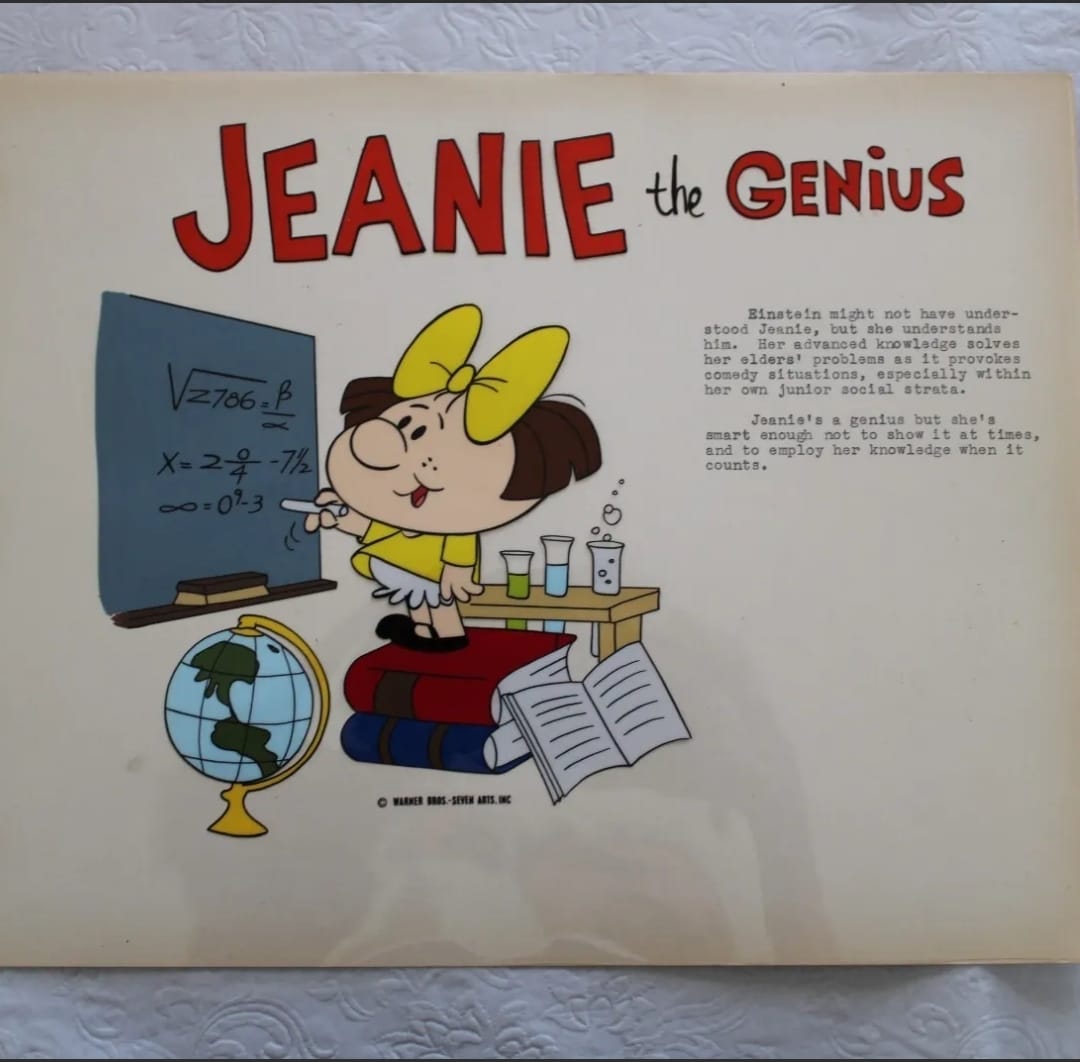

Even though Looney Tunes Cartoons as we know it ceased production in 1962, Warner Bros continued to issue out new cartoon shorts for another seven years, only stopping for good in late 1969. Where were they coming from? What it boils down to is that WB couldn't make up their minds whether to stop making theatrical shorts or not, and waffled on it throughout the 1960s.
The first time they changed their mind was right after they dissolved Termite Terrace. Friz Freleng still wanted work and partnered with Looney Tunes' last executive, David H. DePatie, to form DePatie-Freleng Enterprises in the exact same building. Then when WB felt remorse about a minute later, they contracted DFE to start making shorts again. Talk about walking in a circle.
These new shorts, however, couldn't avoid feeling different. The gang had been broken up, and with it went the chemistry that created the original magic. These shorts were also working with a smaller budget, a music score that was downsized from a full orchestra to the twangs and boings of Bill Lava, and a weird, board-mandated fixation on putting Daffy and Speedy Gonzales together. There's not much from this era that's watchable, but it was about to get weirder.
After three years of "outsourcing" work to DFE, WB decided they wanted to produce their own shorts once more, and kicked Freleng out in favor of...well, we don't know what the revamped studio was originally meant to be called because right after it started, Warner Bros. was bought by Seven Arts and its public name was announced as "Warner Bros - Seven Arts Animation," or just "W7" for short. It would be the first in a long line of similar buyouts throughout the studio's 100-year history. If there's a pattern to WB's fate, it's that it's been tossed around more times than any other studio, toyed with on a whim by various companies before being thrown to someone else. The Zaslav debacle is just the latest chapter.


Even though WB's line of animated characters was among the most iconic in the world, Seven Arts wanted new guys. Someone managed to track down over thirty images and drawings for new Looney Tunes characters that were thrown around WB. None of them really feel like Looney Tunes in the classic sense, and more resemble the flatly drawn Saturday Morning filler that defined TV animation at the time. The handul of concepts that DID get out -- "Cool Cat," "Merlin the Magic Mouse" and "Bunny and Claude" -- did not set the world on fire or get their own Tang commercials. (Though "Bunny and Claude," created by Robert McKimson, is not that bad if you ask me,)
However, there was one wild standout that was unlike any of the other pitches, or anything else that made it to screen. On February 3, 1968 WB introduced the most off-brand Looney Tunes character the world had ever seen or probably will see. Say hello to Norman Normal.
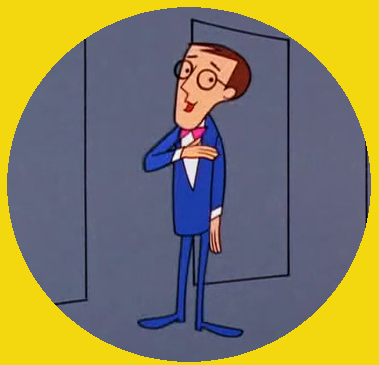
What does Norman Normal do that's funny? Nothing. What are his catchphrases? He doesn't have any. He doesn't drop anvils, he doesn't plummet from cliffs, he doesn't even squash or stretch. Norman Normal is just a man, who just happens to be there, existing, in his own six-minute feature in the WB library. That's all, folks -- that's LITERALLY all.
Well, Norman does do one thing. He comments on stuff. He walks around society and points out its flaws, and expresses his disapproval in many, many paragraphs. He's the Anti-Looney Tune. He completely breaks the convention.
Norman Normal, the short, is based on the 1966 Peter, Paul And Mary song of the same name. Paul Stookey, the "Paul" of the band, co-produced the short and was involved with much of it. It opens and closes with the song, performed by a quartet of shaggy-haired multicolored men.
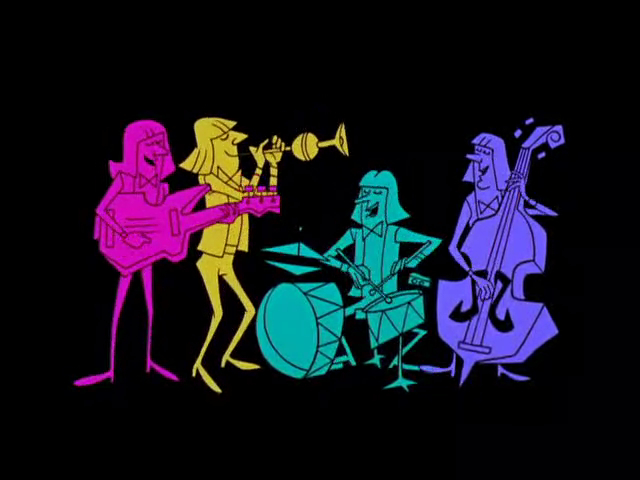
"There's someone
you've got to meet, and you see him every day. His face will look
familiar, but in a most unusual way. He's NORMAN NORMAAAAAL! I
said NORMAN NORMAAAAAL! He looks a lot like you."
This song's melody is VERY similar to "Secret Agent
Man," which was released by Johnny Rivers the same year
(though it premiered two years earlier as the theme song to the
British TV series "Secret Agent," and Paul could have
been watching).
The short takes place within Norman's mind, as he walks through a hallway with many doors containing his memories, and reflects on the many places he's been that week. The first: his boss's office.
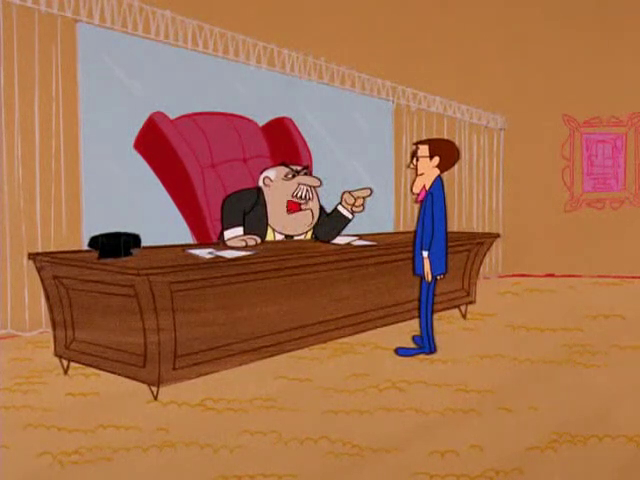
Norman's boss, who sells ball bearings, is chasing a client that could be huge for them, if he could just tie him down and get him to commit. The boss is tired of waiting and thinks he knows the perfect solution. "He's got a weakness we discovered....LIQUOR! I want you to take him to all the best clubs, get him really juiced up, keep a copy of the contract in your pocket, and just before he passes out, sliiiiiiide it under his nose and get him to sign."
This scheme is abhorrent to
Norman's principles and he lets the boss know it. "I can't
take out this man that I don't even know to a night club I never
even go to, and try to sell him ball bearings by getting him
DRUNK."
"Come on, Norman, nobody will ever know."
"I'll know."
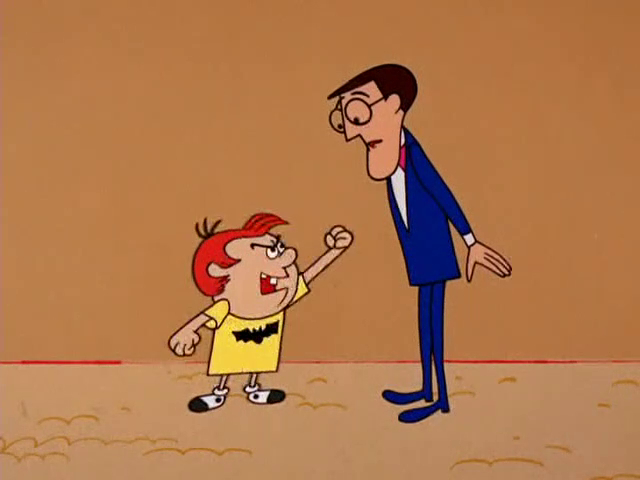
As they're arguing, the boss
visually turns into younger and younger versions of himself as
his methods of persuasion grow more juvenile. "Listen you
wanna be in the GANG? What's-a matter, you CHICKEN? I DARE
ya!"
When Norm doesn't bend, the old man turns back into himself and
uses a more persuasive argument: "Perhaps I musjudged you.
Perhaps you're not mature enough to take on executive
responsibility. Perhaps a different man...perhaps Phil, there's a
go-getter."
"NO, I CAN DO IT, BOSS! JUST GIVE ME A CHANCE."
"Oh very well, Norman, Bring the signed contract to me first thing in the morning."
As he walks out of the office and back into the halls of his mind, Norman realizes he's been bamboozled....and that there's absolutely no way he can bring himself to actually do this. "I know what I'll do...I'll go to the man's office and just say we've either got a good ball bearing or we haven't. You don't buy favors with alcohol."
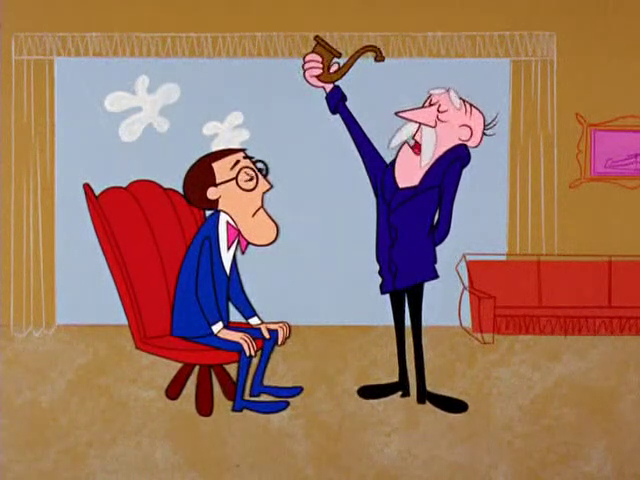
Confused, Norman enters a different memory where he turns to his uppity mustachioed father for advice. "What's right and wrong, Dad? I mean, I know what's right and wrong, but everybody seems to have their own kind."
Instead of answering the question, his father spews forth stories of trudging to school 1,000 miles in the snow, growing up in the Depression and selling apples, riding the trolley, etc. He rambles on and on while smoking his pipe.
"What do you do when your
friends say one thing and do the other, and then they look down
on you if you don't live the way they do? It's very confusing,
Dad."
"Now we have two cars...a nice house, nice clothes, good
food....SUCCESS, Norman! That's the main thing! Learning to FIT
IN! Don't make waves, Norman. Learn to....fit in." As his
pop speaks, he floats near a wallpaper with a noisy pattern and
disappears into it.
Symbolism is rampant in Norman Normal, and it continues in his next vision, which takes place at a party. There's this guy named Leo with a lampshade on his head who keeps turning it on and shouting "APPROVAL! APPROVAL!" You see, he's debasing himself to be loved by an audience, so he just literally shouts his motive. That's deep, man.
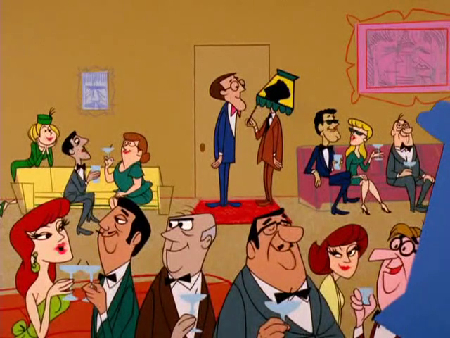
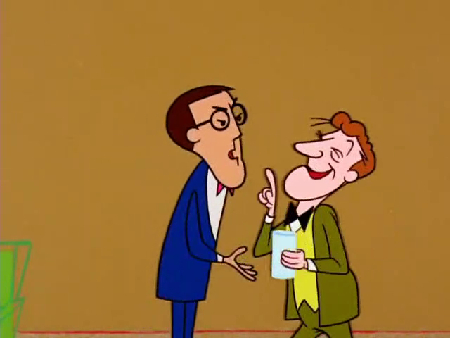
Most of the people Norman meets at this party are drunk off their rockers, like the guy staggering toward him now who congratulates him on closing the ball bearing deal (there's your resolution for that segment) and then launches into a joke. "Hey, didja ever hear the one about the traveling salesman and rhe eskimo?"
As he goes into it, Norman tries to stop him. "Listen, uh, I don't wanna interrupt your story, but is this joke you're gonna tell me about a minority group, and then, uh, after you tell it we're all gonna laugh and feel superior?" This moment blows my mind. We've been told part of the reason so many movies and TV shows used ethnic stereotypes back then was because the writers didn't know any better, but here's Norman completely shattering that notion.
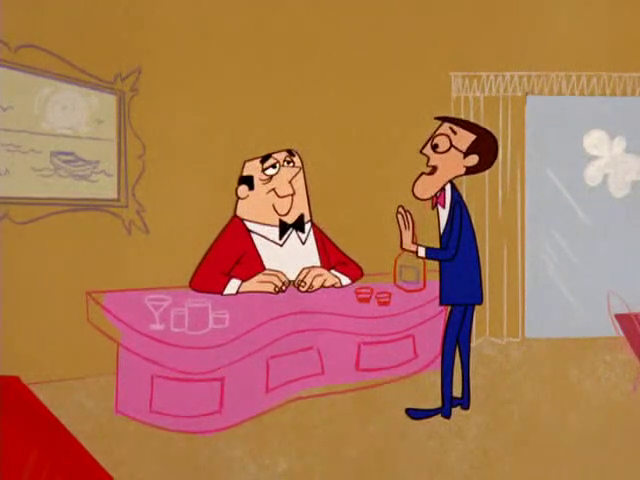
Even the bartender is drunk,
and when he offers Norman some shots, Norman declines.
"Whazza matter, cantcha hold yer licker? Ya scared of a
little Jack? It's a PARTY, Norm, come on and loosen up."
"No, I'm loose enough already. I'll just have a little
ginger ale."
When he hears this, the
bartender gets unusually beligerent. "Listen, ya prolly
don't LIKE yerself when ya had a couplea drinks, do ya? Ya can't
TAKE IT when the REAL PERSONALITY comes out, CAN YA, NORM?"
Norm becomes agitated himself. "Oh, well, screw it,
Al."
Al yells back as Norman leaves, "A GUY LIKE YOU REALLY KNOWS
HOW TO SPOIL A PARTY."
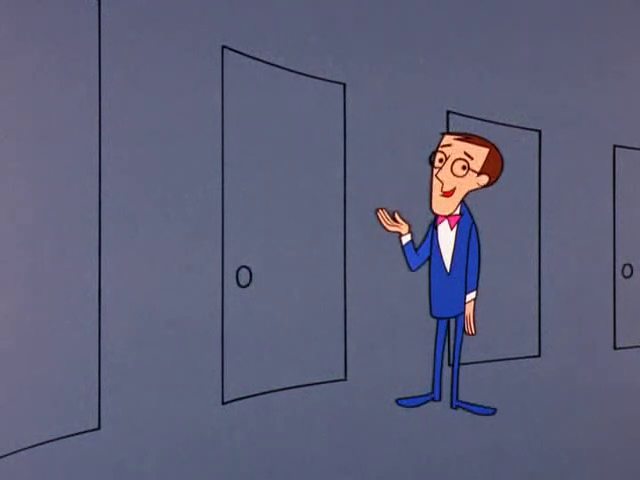
Back in the mind hallway,
Norman apologizes to the viewer for "getting them
involved" in the argument. "It's just that there are so
many doors in here."
He re-opens the door with the band, who are continuing to play
the song.
Six minutes isn't a lot of time, so a lot of Looney Tunes shorts tended to end abruptly, and so does this one. The final scene is a pull-back from the hallway to reveal ANOTHER door directly in Norman's head. Norman closes it with his finger and says "Well." It sounds like he's about to say something but....he just doesn't. The cartoon just cuts to the W7 shield and ends.
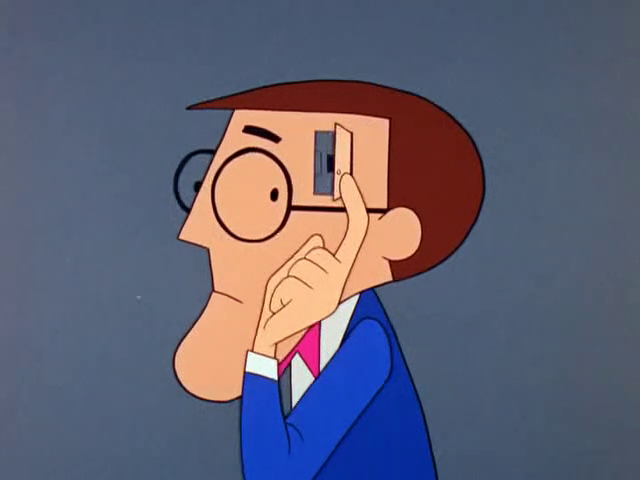
Norman Normal has never been seen or used outside of this short, and the most likely reason for that has to be his origins as a Peter, Paul And Mary song snarling the rights issues. Paul wanted to make more shorts with him, but the closure of WB Animation put the kibosh on that.
Even Cool Cat gets dug out of mothballs every now and then, but not Norman. And believe it or not, that's a shame. The idea of Norman just SHOWING UP in classic Looney Tunes scenarios and BEING HIMSELF is hilarious to me. Just imagine...
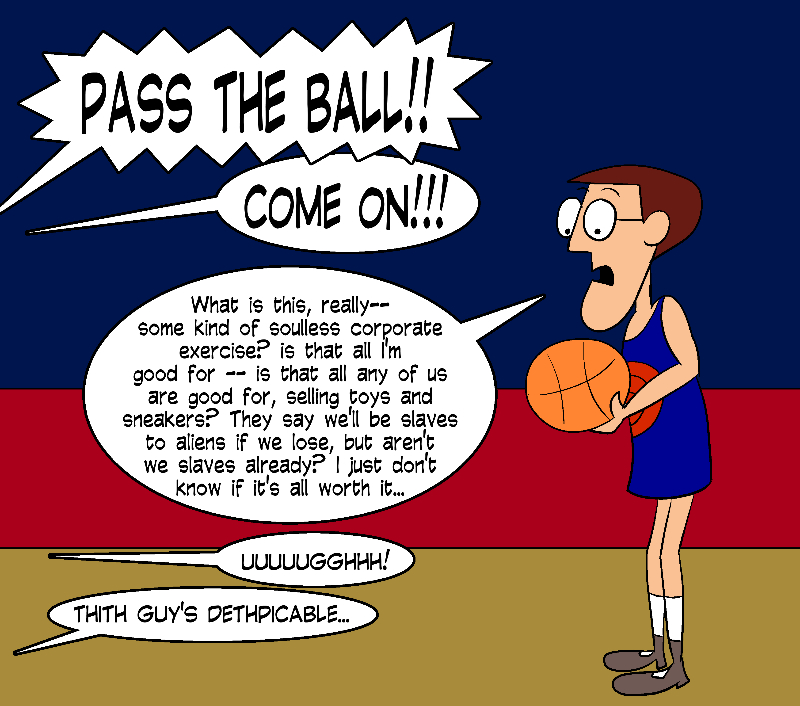
Bugs: "Do you want to
shoot me now, or wait until you get home?"
Daffy: "SHOOT HIM NOW! SHOOT HIM NOW!"
Bugs: "You keep out of this, he doesn't HAVE to shoot you
now."
Norman Normal: "Does he have to shoot him anytime? Frankly, I'm appalled by this barbaric act that you call a pasttime, Mr. Fudd. It seems to me, we evolved past the need to shoot wild animals a long time ago...are we all just revering to neanderthals now? And Mr. Duck, have you ever gotten that lisp checked out? It could be a sign of a serious medical condition. I'm just saying."
Bugs: "......."
Daffy: "......"
Elmer: "Uh.....wut?"
Norman Normal: "You're just channeling your inner aggressions from being cursed with baldness, aren't you?"
Dog: "But mostly, I'm 100%
Labrador Retriever."
Norman Normal: "That is nonsense. I believe that you're
lying to me."
Dog: "Well, I'll prove it.
Go find me a Labrador, and I'll retrieve it."
Norman Normal: "....."
Dog: "Do you GOT a Labrador? Do you know where you can GET a
Labrador?"
Norman Normal: "Actually, Labrador Retrievers are named after the Labador region of a colony in Newfoundland. They were imported to the United Kingdom from that region, before it became a province of Canada. So the idea that I can just GET a Labrador, as if it were a physical object, is just absurd, if you don't mind my saying so. Where were you going with this?"
Dog: "......"
Dog: "Sheddepp. I really mean it this time."
We've been robbed of these scenes, as well as the Tiny Toons character that would have been based on him, "Andy Average." Andy would do things like walk up to Babs and say "Do you really think all these impressions of 90s celebrities are going to hold up over time?" Robbed, we were robbed.
Well.